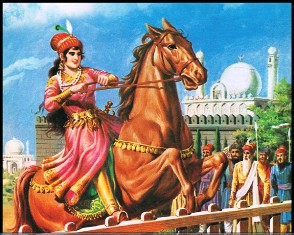
Razia Sultan
Razia Sultan, also known as Razia Sultana, and by her regnal name Jalâlat-ud-Dîn Raziyâ, was the only woman to rule the Delhi sultanate suo jure. She preferred to be referred to as “Razia Sultan” as opposed to “Sultana”, as the latter literally meant “wife of a king” as opposed to what she truly was.
Razia’s father, Iltutmish, had been a slave before he became sultan. He rose through the ranks by gaining the trust of his master, and he was later appointed sultan. He was also the first in the history of the sultanate to appoint a woman as his heir apparent: his daughter Razia, in whom he recognized shrewdness of character and diplomacy to make a good ruler. Originally, his eldest son was groomed for the throne, but he died, leaving Iltutmish no sons whom he believed were worthy of the throne. When Iltutmish died, the Muslim nobility refused to honor his wishes in appointing a woman sultan, so power passed to his other son, Ruknuddin, instead. Ruknuddin was not a good ruler and did not have the temperament necessary, which is perhaps why Iltutmish named his daughter successor over his son. In the six months of his reign, Ruknuddin turned to vices and debauchery, angering the citizens. He and his mother, Shah Turkaan, (who was ruling through him) were executed.
The nobility had no choice now but to name Razia sultan. As a ruler, Razia was shrewd and competent. She was involved in state affairs even before she was sultan, so she had the knowledge of how to run a country. She managed to manipulate her rivals into opposing each other, allowing her to continue to rule the country.
Trouble occurred later when nobles decided to join forces and revolt against her. There are legends and stories that explain why that happened, but there are too many inconsistencies for any one to be believed utterly. The rebels captured the city and stripped Razia of power. She was entrusted to the care of her childhood friend Altunia. Thus, she lived the rest of her life in luxurious imprisonment.
Sources
http://biography.yourdictionary.com/razia
https://en.wikipedia.org/wiki/Razia_Sultana
